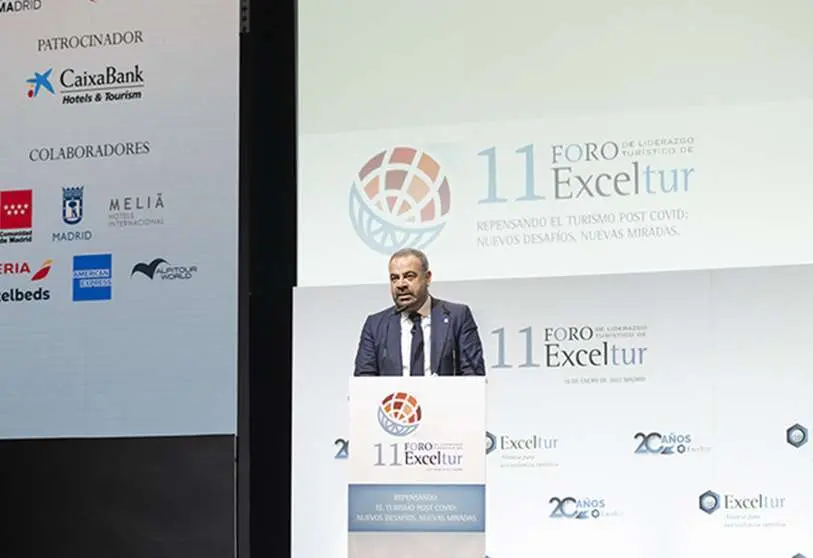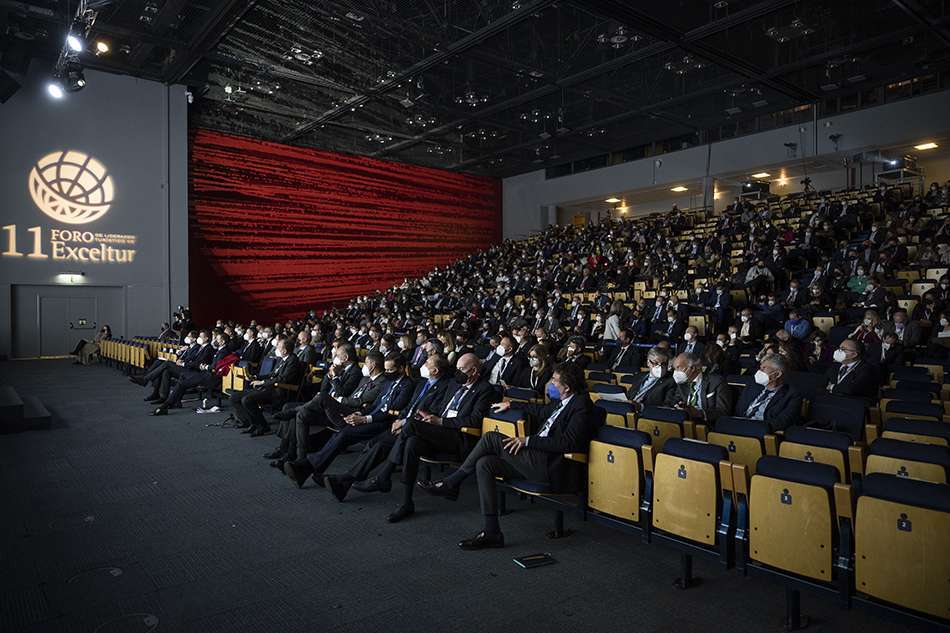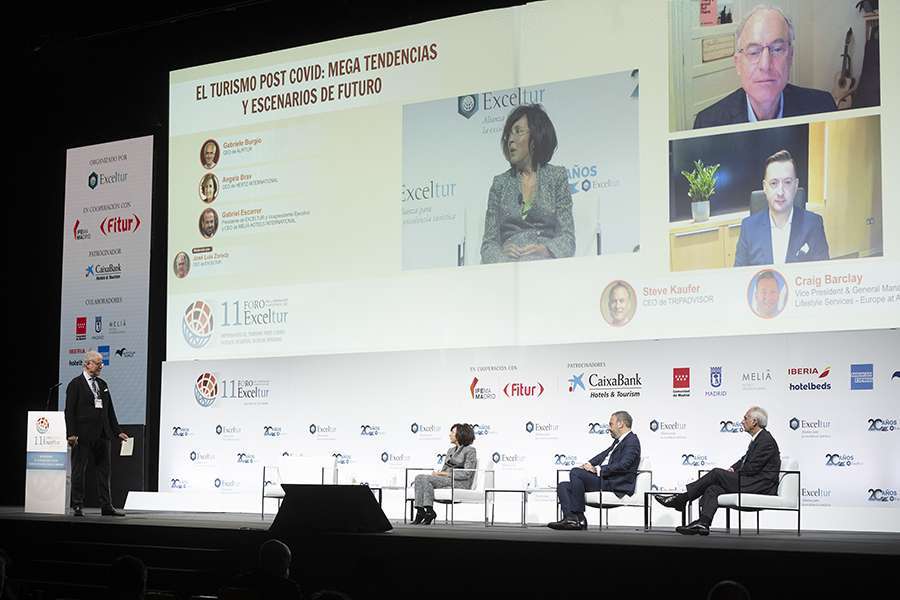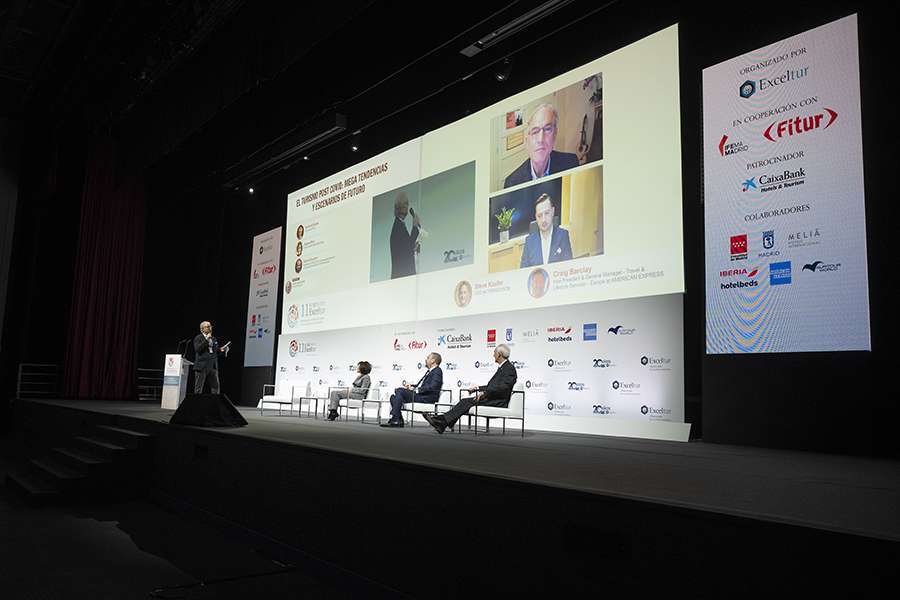Gabriel Escarrer stresses the need for a specific PERTE for tourism during the XI Exceltur Forum

The coronavirus has posed a major challenge for tourism, a key part of the Spanish economy. The two-year pandemic has had devastating effects on the sector. National and international restrictions have led to a considerable drop in the number of foreign tourists, hurting the traditional sun and beach destinations. During 2021, revenues related to foreign demand fell by 60%; that year, Spain received 31 million foreign tourists, a far cry from the 80 million in 2019.
However, during 2021 Spain witnessed a recovery in the sector, despite the emergence of the omicron variant in December. On the other hand, in addition to COVID-19, tourism has to adjust to new scenarios of the current and global situation, such as environmental protection or digitalisation.
In this context, and as a prelude to FITUR (International Tourism Trade Fair), Exceltur, an association made up of 33 companies in the tourism sector, has held its eleventh forum focused on post-COVID tourism, with its new challenges and opportunities.

José Vicente de los Mozos, president of IFEMA's Executive Committee; and Gabriel Escarrer, president of Exceltur and executive vice-president and CEO of Meliá Hotels International, were in charge of inaugurating the dialogue space under the title 'Rethinking post-COVID tourism: new challenges, new perspectives'. Both began their speeches by expressing their solidarity with the citizens of La Palma. "Tourism will be a fundamental motor for its recovery", said Escarrer.
The president of Exceltur began his opening speech by outlining five fundamental aspects on which the sector should focus. According to Escarrer, Spanish tourism must diversify, differentiate itself, reduce its impact on the environment, promote digitalisation and ensure the best talent for the new needs of tourism. He also recalled that during the months when tourism activity fell, so did the levels of well-being and prosperity of citizens. "The weight of tourism is not only projected in terms of creating more and better jobs, but also in socially relevant areas such as diversity and work-life balance," he explained. The president of Exceltur presented the main issues to be addressed during the debate related to the sector: strengthening the pioneering destinations of the Spanish coastline, innovating the destinations of inland Spain, promoting a strategy that is more committed to society and accelerating digitalisation.

Despite the serious health crisis, the sector "has been quite resilient and has a promising future", as during the pandemic, the desire to travel has not ended, indeed, it has been shown that travel is a "basic necessity for physical and mental wellbeing". On this point, de los Mozos agreed, stressing the "need to travel" and describing tourism as "a brave and committed sector".
Escarrer then outlined some of the requests that Exceltur has made to the government. Among these demands are a PERTE (Strategic Project for the Recovery and Economic Transformation) for Spanish tourism, a great Plan Renove del Litoral (Renewal Plan for the Coast) or the Plan Renacer Turismo (Tourism Renaissance Plan). These plans, however, "have not been as well received as we had hoped", he explained. Along these lines, Escarrer expressed his disappointment with the awarding of the first tranche of the Next Generation European funds, as "it opens the door to any municipality applying for funds for tourism projects of a very diverse nature and size, dispersed and with little or no potential to transform the country's competitiveness". He also urged the government to maintain and increase public support for the sector, such as ERTE, SEPI and COFIDES aid.

In addition to the health crisis, the tourism sector has had to face international lack of coordination, restrictions and uncertainty. "Quarantines also 'kill', not people, but companies, jobs and dreams," lamented Escarrer. To conclude, he stressed that this sector should be on the fringes of political confrontation and should be "a true state policy to continue to be a key driver of the economy and the creation of the best jobs, thus contributing to a fairer, more social, egalitarian and sustainable future".
After the inauguration, José Luis Zoreda, CEO of Exceltur, led a discussion with the heads of several key companies in the sector worldwide: Gabriele Burgio, CEO of Alpitour; Steve Kaufer, CEO of Tripadvisor; Craig Barclay, vice-president of American Express in Europe; and Angela Brav, CEO of Hertz International. Escarrer also took part in the debate.
Brav, director of the car rental company, called on governments to become more involved in the sector, for example, by investing more in the infrastructure needed to acquire electric vehicles. He also alluded to new forms of mobility, such as electric scooters and bicycles. "People need to move, we can't impose on them how to do it, we have to give them options so that they feel comfortable," he said.

Burgio, who runs the Italian group Alpitour, insisted on the high demand in the sector. However, he acknowledged major obstacles for tourists, such as uncertainty and fear. "We have to be patient. The government and the press don't help us, journalists prefer to tell bad news," Burgio said. With regard to the differences in tourism between Spain and Italy, Burgio praised the national infrastructure system, citing the AVE high-speed train as an example. On the other hand, he stressed that Italy has more domestic tourism.
Due to the uncertainty, tourists are looking for health security and flexibility in airports and hotels. This also has a positive effect on travel agencies, as tourists prefer organised trips. Escarrer also pointed to a change in the mentality of consumer habits and sustainability. "The customer wants to be part of a company that cares about the environment and its workers," he said. "Customers are willing to pay a little more if sustainability is shown," he added. Barclay agrees. The Vice President of American Express on the European continent points to "slow" tourism, which boosts local commerce. This type of tourism consists of longer trips where aspects such as gastronomy play a key role.

On the other hand, Kaufer of Tripadvisor, estimates that, on a global level, "the big destinations are going to recover soon". In the United States, he highlights cities such as Las Vegas, New York and Orlando, while internationally he points to Paris, Rome and Venice. "The popular cities of 2019 are going to continue to be popular this year," he declared.
As a conclusion of the colloquium, the participation of the new generations in tourism has been underlined. "Young travellers don't want the services of 50-year-olds," Brav revealed. The potentates also stressed the need to empower small hotels and public-private cooperation to tackle the problems related to COVID-19.
José Ignacio Goirigolzarri, Chairman of CaixaBank, also took part in the Exceltur focus. Goirigolzarri recalled the large number of Spanish hotels that are members of the bank, an aspect that generates "pride and responsibility". CaixaBank has supported the sector during the pandemic with ICO credits, in addition, financing during the past year has been the highest in history, "which demonstrates the commitment to the sector".

Goirigolzarri explained that tourism, like the economy, experienced a favourable evolution in 2021, despite the appearance of omicron in December. "The reactivation of tourism is fundamental for the recovery of Spain's economy," he said.
The bank's president also gave forecasts for this year. GDP in 2022 could grow by 5.5%, returning to pre-pandemic levels by the end of the year. Goirigolzarri alluded to European funds, urging them to be managed "with transparency". "Spain is a country of SMEs, and the funds must reach them". The chairman of the bank concluded his speech by highlighting the public-private partnership for the recovery of the economy and the tourism sector.
The 11th Exceltur Forum will also be attended by important figures from national politics, such as Pablo Casado, leader of the opposition, several regional presidents, vice-presidents and mayors. Also taking part are representatives of the country's tourism companies and the president of the Dominican Republic, Luis Abinader.








